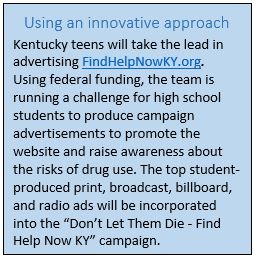Kentucky Takes a Novel Approach to Fight the Opioid Crisis
Posted on by
The opioid overdose epidemic is a public health emergency. The state of Kentucky has the third highest rate of drug overdose in the country. The FindHelpNowKY.org website bridges a gap between Kentucky residents and timely access to substance use treatment facilities and services. It provides near real-time available openings at local area substance use disorder (SUD) facilities.
Tailoring treatment options
You can use over 30 different search criteria on the website to find the right SUD treatment facility for your needs. These criteria include accepted insurance, gender identity, facility type (inpatient and outpatient treatment facilities etc.), and co-occurring treatment for mental health disorders. Over 500 SUD treatment facilities appear on the website who update their opening availability daily to facilitate rapid matching of individual treatment need with available treatment. The easy to use design of the FindHelpNowKY.org landing page helps high-priority populations, like adolescents and pregnant women, find treatment options and availability.
Providing FindHelpNowKY.org to Those in Need
FindHelpNowKY.org is running a promotional campaign during the summer of 2018 to:
- Raise awareness of the site as a valuable resource to quickly locate SUD treatment facilities with available openings. TV spots, radio ads, billboards, and digital media ads will run to reach primary audiences.
- Drive website traffic and use by:
- family and friends of individuals with SUDs, and individuals with SUDs (primary audiences); and
- health care providers including primary care providers and first responders (secondary audiences). The website is being promoted at physician association meetings, and physician pocket cards with SUD resources, including FindHelpNowKY.org will be distributed
- Inform the public about SUD educational information available on FindHelpNowKYorg.
Measuring progress
Kentucky assessed the need for the FindHelpNowKy.org website based on a physician focus group, Office of Drug Control Policy (ODCP) input, and community mental health centers’ feedback. These stakeholders helped identify the need for this website and the need for more timely access to SUD treatment. Metrics to measure success will include website analytics, surveys of SUD treatment providers, and average search time
FindHelpNowKY.org has had over 100,000 page views and over 26,000 unique searches from February 1, 2018- August 7, 2018.. Approximately 40% of website visits originated from social media, google searches, and referrals from other websites. Most users spent an average of 7.5 minutes on the website, suggesting that they were reading and engaged with the content. Visitors also ran 2-3 searches during their visits, indicating that they conducted unique searches based on differing search criteria.
Common searches also included seeking long-term residential or outpatient treatment facilities that accept Medicaid or Medicare. The FindHelpNow domain is being obtained by Kentucky so that interested states can use the FindHelpNow website platform with their respective state facility data in it.
Learn more
- If you or a loved one requires assistance or information on SUD treatment and prevention topics contact the statewide hotline number 1-833-8KY-HELP
- Kentucky Drug Overdose Prevention Program (http://www.mc.uky.edu/kiprc/programs/kdopp.html)
- Don’t Let Them Die, The Governor of Kentucky’s communication campaign that seeks to raise awareness of the dangers of opioid use
We want to hear from you!
Leave a comment below about what your state is doing to combat the opioid overdose epidemic. This was developed by the Kentucky Drug Overdose Prevention Program at the Kentucky Injury Prevention and Research Center, at the University of Kentucky’s College of Public Health as bona fide agent for the Kentucky Department for Public Health. The project was a collaboration between the office of Kentucky Governor Matt Bevin, Kentucky Cabinet for Health and Family Services, and Justice and Public Safety Cabinet.
Funding for the website came from the CDC National Center for Injury Prevention and Control. FindHelpNowKY.org was supported by Cooperative Agreement Number, 5 NU17CE002732-03, funded by the Centers for Disease Control and Prevention. Its contents are solely the responsibility of the authors and do not necessarily represent the official views of the Centers for Disease Control and Prevention or the Department of Health and Human Services.
Posted on by

